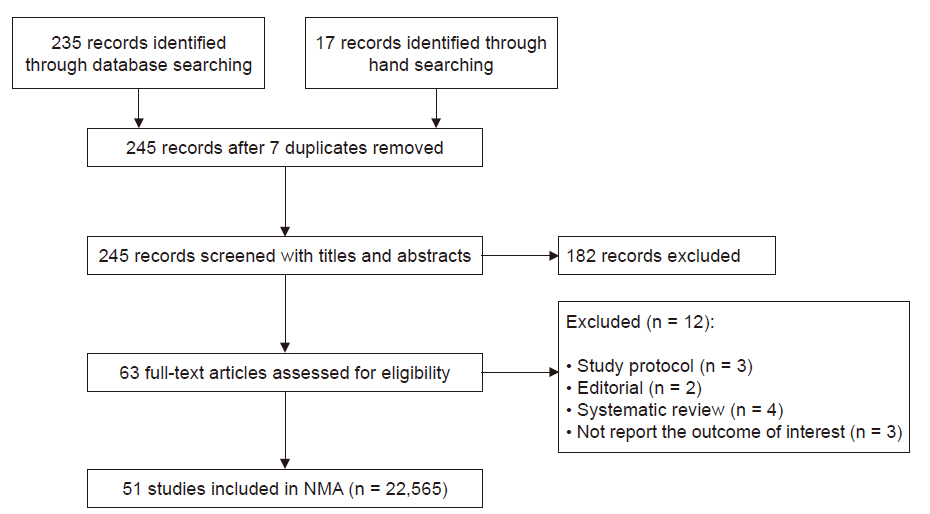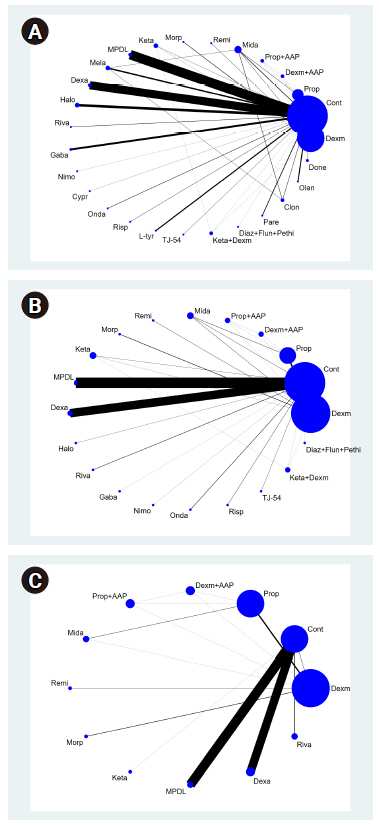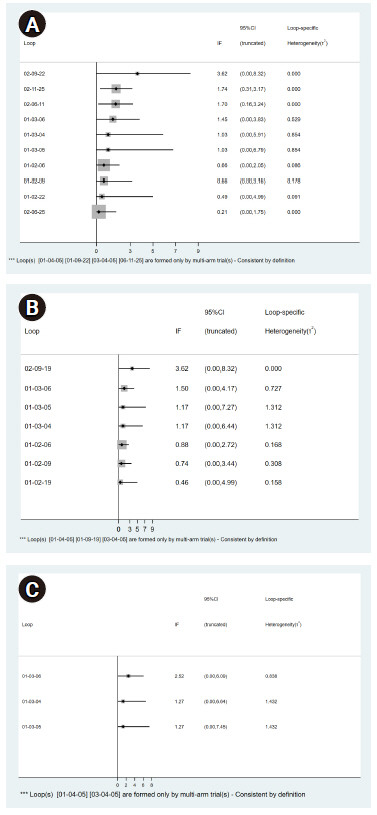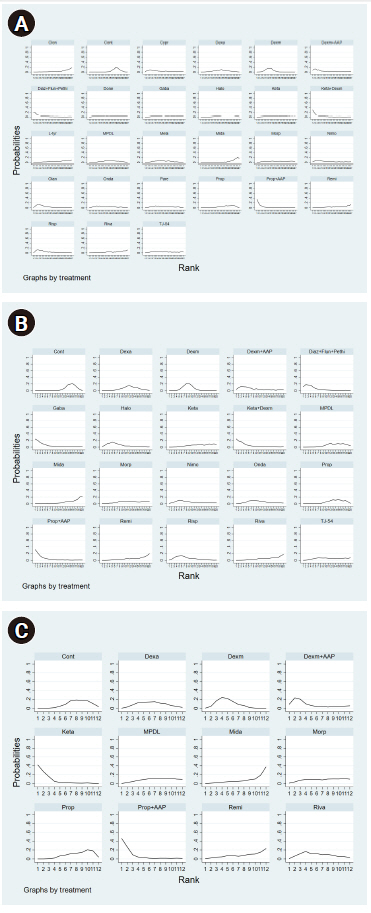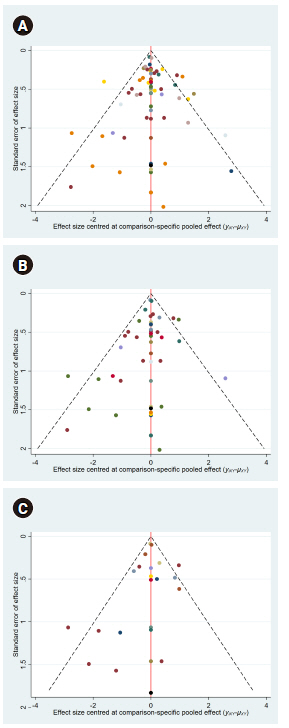Anesth Pain Med.
2021 Jan;16(1):28-48. 10.17085/apm.20079.
Pharmacological strategies to prevent postoperative delirium: a systematic review and network meta-analysis
- Affiliations
-
- 1Department of Anesthesiology and Pain Medicine, Chung-Ang University College of Medicine, Seoul, Korea
- 2The Institute of Evidence Based Clinical Medicine, Chung-Ang University, Seoul, Korea
- KMID: 2512280
- DOI: http://doi.org/10.17085/apm.20079
Abstract
- Background
Postoperative delirium (POD) is a condition of cerebral dysfunction and a common complication after surgery. This study aimed to compare and determine the relative efficacy of pharmacological interventions for preventing POD using a network meta-analysis (NMA).
Methods
We performed a systematic and comprehensive search to identify and analyze all randomized controlled trials until June 29, 2020, comparing two or more pharmacological interventions, including placebo, to prevent or reduce POD. The primary outcome was the incidence of POD. We performed a network meta-analysis and used the surface under the cumulative ranking curve (SUCRA) values and rankograms to present the hierarchy of the pharmacological interventions evaluated.
Results
According to the SUCRA value, the incidence of POD decreased in the following order: the combination of propofol and acetaminophen (86.1%), combination of ketamine and dexmedetomidine (86.0%), combination of diazepam, flunitrazepam, and pethidine (84.8%), and olanzapine (75.6%) after all types of anesthesia; combination of propofol and acetaminophen (85.9%), combination of ketamine and dexmedetomidine (83.2%), gabapentin (82.2%), and combination of diazepam, flunitrazepam, and pethidine (79.7%) after general anesthesia; and ketamine (87.1%), combination of propofol and acetaminophen (86.0%), and combination of dexmedetomidine and acetaminophen (66.3%) after cardiac surgery. However, only the dexmedetomidine group showed a lower incidence of POD than the control group after all types of anesthesia and after general anesthesia.
Conclusions
Dexmedetomidine reduced POD compared with the control group. The combination of propofol and acetaminophen and the combination of ketamine and dexmedetomidine seemed to be effective in preventing POD. However, further studies are needed to determine the optimal pharmacological intervention to prevent POD.
Figure
Reference
-
1. Li YN, Zhang Q, Yin CP, Guo YY, Huo SP, Wang L, et al. Effects of nimodipine on postoperative delirium in elderly under general anesthesia: a prospective, randomized, controlled clinical trial. Medicine (Baltimore). 2017; 96:e6849.2. Liu Y, Ma L, Gao M, Guo W, Ma Y. Dexmedetomidine reduces postoperative delirium after joint replacement in elderly patients with mild cognitive impairment. Aging Clin Exp Res. 2016; 28:729–36.3. American Geriatrics Society Expert Panel on Postoperative Delirium in Older Adults. Postoperative delirium in older adults: best practice statement from the American Geriatrics Society. J Am Coll Surg. 2015; 220:136–48.e1.4. Maldonado JR, Wysong A, van der Starre PJ, Block T, Miller C, Reitz BA. Dexmedetomidine and the reduction of postoperative delirium after cardiac surgery. Psychosomatics. 2009; 50:206–17.5. Parikh SS, Chung F. Postoperative delirium in the elderly. Anesth Analg. 1995; 80:1223–32.6. He F, Shen L, Zhong J. A study of dexmedetomidine in the prevention of postoperative delirium in elderly patients after vertebral osteotomy. Int J Clin Exp Med. 2018; 11:4984–90.7. Whitlock EL, Vannucci A, Avidan MS. Postoperative delirium. Minerva Anestesiol. 2011; 77:448–56.8. Reddy SV, Irkal JN, Srinivasamurthy A. Postoperative delirium in elderly citizens and current practice. J Anaesthesiol Clin Pharmacol. 2017; 33:291–9.9. Janssen TL, Alberts AR, Hooft L, Mattace-Raso F, Mosk CA, van der Laan L. Prevention of postoperative delirium in elderly patients planned for elective surgery: systematic review and meta-analysis. Clin Interv Aging. 2019; 14:1095–117.10. Liu Y, Li XJ, Liang Y, Kang Y. Pharmacological prevention of postoperative delirium: a systematic review and meta-analysis of randomized controlled trials. Evid Based Complement Alternat Med. 2019; 2019:9607129.11. Nazemi AK, Gowd AK, Carmouche JJ, Kates SL, Albert TJ, Behrend CJ. Prevention and management of postoperative delirium in elderly patients following elective spinal surgery. Clin Spine Surg. 2017; 30:112–9.12. Zhang H, Lu Y, Liu M, Zou Z, Wang L, Xu FY, et al. Strategies for prevention of postoperative delirium: a systematic review and meta-analysis of randomized trials. Crit Care. 2013; 17:R47.13. Al Tmimi L, Verbrugghe P, Van de Velde M, Meuris B, Meyfroidt G, Milisen K, et al. Intraoperative xenon for prevention of delirium after on-pump cardiac surgery: a randomised, observer-blind, controlled clinical trial. Br J Anaesth;2020. doi: 10.1016/j.bja.2019.11.037. [Epub ahead of print].14. Shen QH, Li HF, Zhou XY, Yuan XZ. Dexmedetomidine in the prevention of postoperative delirium in elderly patients following non-cardiac surgery: a systematic review and meta-analysis. Clin Exp Pharmacol Physiol. 2020; 47:1333–41.15. Cui Y, Li G, Cao R, Luan L, Kla KM. The effect of perioperative anesthetics for prevention of postoperative delirium on general anesthesia: a network meta-analysis. J Clin Anesth. 2020; 59:89–98.16. ; PRISMA-P Group. Preferred reporting items for systematic review and meta-analysis protocols (PRISMA-P) 2015: elaboration and explanation. BMJ. 2015; 350:g7647.17. Higgins JPT, Thomas J, Chandler J, Cumpston M, Li T, Page M, et al. Cochrane handbook for systematic reviews of interventions. 2nd ed. Hoboken: Wiley-Blackwell;2019.18. Cornell JE. The PRISMA extension for network meta-analysis: bringing clarity and guidance to the reporting of systematic reviews incorporating network meta-analyses. Ann Intern Med. 2015; 162:797–8.19. Viera AJ, Garrett JM. Understanding interobserver agreement: the kappa statistic. Fam Med. 2005; 37:360–3.20. Higgins JPT, Savović J, Page MJ, Elbers RG, Sterne JAC. Assessing risk of bias in a randomized trial. In: Cochrane handbook for systematic reviews of interventions. 2nd ed. Edited by Higgins JPT, Thomas J, Chandler J, Cumpston M, Li T, Page M, et al.: Hoboken, Wiley-Blackwell. 2019.21. Chaimani A, Higgins JP, Mavridis D, Spyridonos P, Salanti G. Graphical tools for network meta-analysis in STATA. PLoS One. 2013; 8:e76654.22. White IR, Barrett JK, Jackson D, Higgins JP. Consistency and inconsistency in network meta-analysis: model estimation using multivariate meta-regression. Res Synth Methods. 2012; 3:111–25.23. Salanti G, Ades AE, Ioannidis JP. Graphical methods and numerical summaries for presenting results from multiple-treatment meta-analysis: an overview and tutorial. J Clin Epidemiol. 2011; 64:163–71.24. Atkins D, Best D, Briss PA, Eccles M, Falck-Ytter Y, Flottorp S, GRADE Working Group, et al. Grading quality of evidence and strength of recommendations. BMJ. 2004; 328:1490.25. O'Gara B, Marcantonio ER, Pascual-Leone A, Shaefi S, Mueller A, Banner-Goodspeed V, et al. Prevention of early postoperative decline (PEaPoD): protocol for a randomized, controlled feasibility trial. Trials. 2018; 19:676.26. Shankar P, Mueller A, Packiasabapathy S, Gasangwa D, Patxot M, O'Gara B, et al. Dexmedetomidine and intravenous acetaminophen for the prevention of postoperative delirium following cardiac surgery (DEXACET trial): protocol for a prospective randomized controlled trial. Trials. 2018; 19:326.27. Sánchez A, Thomas C, Deeken F, Wagner S, Klöppel S, Kentischer F, PAWEL Study group, et al. Patient safety, cost-effectiveness, and quality of life: reduction of delirium risk and postoperative cognitive dysfunction after elective procedures in older adults-study protocol for a stepped-wedge cluster randomized trial (PAWEL Study). Trials. 2019; 20:71.28. Farlinger C, Clarke H, Wong CL. Perioperative pregabalin and delirium following total hip arthroplasty: a post hoc analysis of a double-blind randomized placebo-controlled trial. Can J Anaesth. 2018; 65:1269–70.29. Joys S, Samra T, Kumar V, Mohanty M, Sodhi HBS, Mahajan S, et al. Comparison of postoperative delirium in patients anesthetized with isoflurane versus desflurane during spinal surgery: a prospective randomized controlled trial. Surg Neurol Int. 2019; 10:226.30. Wang X, Wang Y, Hu Y, Wang L, Zhao W, Wei L, et al. Effect of flurbiprofen axetil on postoperative delirium for elderly patients. Brain Behav. 2019; 9:e01290.31. Shehabi Y, Grant P, Wolfenden H, Hammond N, Bass F, Campbell M, et al. Prevalence of delirium with dexmedetomidine compared with morphine based therapy after cardiac surgery: a randomized controlled trial (DEXmedetomidine COmpared to Morphine-DEXCOM Study). Anesthesiology. 2009; 111:1075–84.32. Royse CF, Saager L, Whitlock R, Ou-Young J, Royse A, Vincent J, et al. Impact of methylprednisolone on postoperative quality of recovery and delirium in the steroids in cardiac surgery trial: a randomized, double-blind, placebo-controlled substudy. Anesthesiology. 2017; 126:223–33.33. Djaiani G, Silverton N, Fedorko L, Carroll J, Styra R, Rao V, et al. Dexmedetomidine versus propofol sedation reduces delirium after cardiac surgery: a randomized controlled trial. Anesthesiology. 2016; 124:362–8.34. Whitlock RP, Devereaux PJ, Teoh KH, Lamy A, Vincent J, Pogue J, SIRS Investigators, et al. Methylprednisolone in patients undergoing cardiopulmonary bypass (SIRS): a randomised, double-blind, placebo-controlled trial. Lancet. 2015; 386:1243–53.35. Li X, Yang J, Nie XL, Zhang Y, Li XY, Li LH, et al. Impact of dexmedetomidine on the incidence of delirium in elderly patients after cardiac surgery: a randomized controlled trial. PLoS One. 2017; 12:e0170757.36. Su X, Meng ZT, Wu XH, Cui F, Li HL, Wang DX, et al. Dexmedetomidine for prevention of delirium in elderly patients after non-cardiac surgery: a randomised, double-blind, placebo-controlled trial. Lancet. 2016; 388:1893–902.37. Wang W, Li HL, Wang DX, Zhu X, Li SL, Yao GQ, et al. Haloperidol prophylaxis decreases delirium incidence in elderly patients after noncardiac surgery: a randomized controlled trial*. Crit Care Med. 2012; 40:731–9.38. Yang X, Li Z, Gao C, Liu R. Effect of dexmedetomidine on preventing agitation and delirium after microvascular free flap surgery: a randomized, double-blind, control study. J Oral Maxillofac Surg. 2015; 73:1065–72.39. Ma P, Piao M, Wang Y, Ma H, Feng C. Influence of dexmedetomidine and sub-anesthetic dose of ketamine on postoperative delirium in elderly orthopedic patients under total intravenous anesthesia. J Jilin Univ Med Ed. 2013; 39:128–32.40. Xuan Y, Fan R, Chen J, Wang Y, Wu J, Yang J, et al. Effects of dexmedetomidine for postoperative delirium after joint replacement in elderly patients: a randomized, double-blind, and placebo-controlled trial. Int J Clin Exp Med. 2018; 11:13147–57.41. Huyan T, Hu X, Peng H, Zhu Z, Li Q, Zhang W. Perioperative dexmedetomidine reduces delirium in elderly patients after lung cancer surgery. Psychiatr Danub. 2019; 31:95–101.42. Shi C, Jin J, Qiao L, Li T, Ma J, Ma Z. Effect of perioperative administration of dexmedetomidine on delirium after cardiac surgery in elderly patients: a double-blinded, multi-center, randomized study. Clin Interv Aging. 2019; 14:571–5.43. Liu X, Zhang K, Wang W, Xie G, Fang X. Dexmedetomidine sedation reduces atrial fibrillation after cardiac surgery compared to propofol: a randomized controlled trial. Crit Care. 2016; 20:298.44. Mei B, Meng G, Xu G, Cheng X, Chen S, Zhang Y, et al. Intraoperative sedation with dexmedetomidine is superior to propofol for elderly patients undergoing hip arthroplasty: a prospective randomized controlled study. Clin J Pain. 2018; 34:811–7.45. Guo Y, Sun LL, Chen ZF, Li QF, Jiang H. [Preventive effect of dexmedetomidine on postoperative delirium in elderly patients with oral cancer]. Shanghai Kou Qiang Yi Xue. 2015; 24:236–9. Chinese.46. Mu DL, Zhang DZ, Wang DX, Wang G, Li CJ, Meng ZT, et al. Parecoxib supplementation to morphine analgesia decreases incidence of delirium in elderly patients after hip or knee replacement surgery: a randomized controlled trial. Anesth Analg. 2017; 124:1992–2000.47. Liu X, Zhang K, Wang W, Xie G, Cheng B, Wang Y, et al. Dexmedetomidine versus propofol sedation improves sublingual microcirculation after cardiac surgery: a randomized controlled trial. J Cardiothorac Vasc Anesth. 2016; 30:1509–15.48. Clemmesen CG, Lunn TH, Kristensen MT, Palm H, Foss NB. Effect of a single pre-operative 125 mg dose of methylprednisolone on postoperative delirium in hip fracture patients; a randomised, double-blind, placebo-controlled trial. Anaesthesia. 2018; 73:1353–60.49. Papadopoulos G, Pouangare M, Papathanakos G, Arnaoutoglou E, Petrou A, Tzimas P. The effect of ondansetron on postoperative delirium and cognitive function in aged orthopedic patients. Minerva Anestesiol. 2014; 80:444–51.50. Priye S, Jagannath S, Singh D, Shivaprakash S, Reddy DP. Dexmedetomidine as an adjunct in postoperative analgesia following cardiac surgery: a randomized, double-blind study. Saudi J Anaesth. 2015; 9:353–8.51. Sheikh TA, Dar BA, Akhter N, Ahmad N. A comparative study evaluating effects of intravenous sedation by dexmedetomidine and propofol on patient hemodynamics and postoperative outcomes in cardiac surgery. Anesth Essays Res. 2018; 12:555–60.52. Mardani D, Bigdelian H. Prophylaxis of dexamethasone protects patients from further post-operative delirium after cardiac surgery: a randomized trial. J Res Med Sci. 2013; 18:137–43.53. Mohammadi M, Ahmadi M, Khalili H, Cheraghchi H, Arbabi M. Cyproheptadine for the prevention of postoperative delirium: a pilot study. Ann Pharmacother. 2016; 50:180–7.54. Fukata S, Kawabata Y, Fujisiro K, Katagawa Y, Kuroiwa K, Akiyama H, et al. Haloperidol prophylaxis does not prevent postoperative delirium in elderly patients: a randomized, open-label prospective trial. Surg Today. 2014; 44:2305–13.55. Kaneko T, Cai J, Ishikura T, Kobayashi M, Naka T, Kaibara N. Prophylactic consecutive administration of haloperidol can reduce the occurrence of postoperative delirium in gastrointestinal surgery. Yonago Acta Medica. 1999; 42:179–84.56. Sugano N, Aoyama T, Sato T, Kamiya M, Amano S, Yamamoto N, et al. Randomized phase II study of TJ-54 (Yokukansan) for postoperative delirium in gastrointestinal and lung malignancy patients. Mol Clin Oncol. 2017; 7:569–73.57. Aizawa K, Kanai T, Saikawa Y, Takabayashi T, Kawano Y, Miyazawa N, et al. A novel approach to the prevention of postoperative delirium in the elderly after gastrointestinal surgery. Surg Today. 2002; 32:310–4.58. de Jonghe A, van Munster BC, Goslings JC, Kloen P, van Rees C, Wolvius R, Amsterdam Delirium Study Group, et al. Effect of melatonin on incidence of delirium among patients with hip fracture: a multicentre, double-blind randomized controlled trial. CMAJ. 2014; 186:E547–56.59. Dieleman JM, Nierich AP, Rosseel PM, van der Maaten JM, Hofland J, Diephuis JC, Dexamethasone for Cardiac Surgery (DECS) Study Group, et al. Intraoperative high-dose dexamethasone for cardiac surgery: a randomized controlled trial. JAMA. 2012; 308:1761–7.60. Kalisvaart KJ, de Jonghe JF, Bogaards MJ, Vreeswijk R, Egberts TC, Burger BJ, et al. Haloperidol prophylaxis for elderly hip-surgery patients at risk for delirium: a randomized placebo-controlled study. J Am Geriatr Soc. 2005; 53:1658–66.61. Sauër AM, Slooter AJ, Veldhuijzen DS, van Eijk MM, Devlin JW, van Dijk D. Intraoperative dexamethasone and delirium after cardiac surgery: a randomized clinical trial. Anesth Analg. 2014; 119:1046–52.62. Park JB, Bang SH, Chee HK, Kim JS, Lee SA, Shin JK. Efficacy and safety of dexmedetomidine for postoperative delirium in adult cardiac surgery on cardiopulmonary bypass. Korean J Thorac Cardiovasc Surg. 2014; 47:249–54.63. Lee C, Lee CH, Lee G, Lee M, Hwang J. The effect of the timing and dose of dexmedetomidine on postoperative delirium in elderly patients after laparoscopic major non-cardiac surgery: a double blind randomized controlled study. J Clin Anesth. 2018; 47:27–32.64. Gamberini M, Bolliger D, Lurati Buse GA, Burkhart CS, Grapow M, Gagneux A, et al. Rivastigmine for the prevention of postoperative delirium in elderly patients undergoing elective cardiac surgery--a randomized controlled trial. Crit Care Med. 2009; 37:1762–8.65. Wu CY, Lu YF, Wang ML, Chen JS, Hsu YC, Yang FS, et al. Effects of dexmedetomidine infusion on inflammatory responses and injury of lung tidal volume changes during one-lung ventilation in thoracoscopic surgery: a randomized controlled trial. Mediators Inflamm. 2018; 2018:2575910.66. Chang YF, Chao A, Shih PY, Hsu YC, Lee CT, Tien YW, NTUH Center of Microcirculation Medical Research (NCMMR), et al. Comparison of dexmedetomidine versus propofol on hemodynamics in surgical critically ill patients. J Surg Res. 2018; 228:194–200.67. Prakanrattana U, Prapaitrakool S. Efficacy of risperidone for prevention of postoperative delirium in cardiac surgery. Anaesth Intensive Care. 2007; 35:714–9.68. Sampson EL, Raven PR, Ndhlovu PN, Vallance A, Garlick N, Watts J, et al. A randomized, double-blind, placebo-controlled trial of donepezil hydrochloride (Aricept) for reducing the incidence of postoperative delirium after elective total hip replacement. Int J Geriatr Psychiatry. 2007; 22:343–9.69. Deiner S, Luo X, Lin HM, Sessler DI, Saager L, Sieber FE, et al. Intraoperative infusion of dexmedetomidine for prevention of postoperative delirium and cognitive dysfunction in elderly patients undergoing major elective noncardiac surgery: a randomized clinical trial. JAMA Surg. 2017; 152:e171505.70. Susheela AT, Packiasabapathy S, Gasangwa DV, Patxot M, O'Neal J, Marcantonio E, et al. The use of dexmedetomidine and intravenous acetaminophen for the prevention of postoperative delirium in cardiac surgery patients over 60 years of age: a pilot study. F1000Res. 2017; 6:1842.71. Hudetz JA, Patterson KM, Iqbal Z, Gandhi SD, Byrne AJ, Hudetz AG, et al. Ketamine attenuates delirium after cardiac surgery with cardiopulmonary bypass. J Cardiothorac Vasc Anesth. 2009; 23:651–7.72. Larsen KA, Kelly SE, Stern TA, Bode RH Jr, Price LL, Hunter DJ, et al. Administration of olanzapine to prevent postoperative delirium in elderly joint-replacement patients: a randomized, controlled trial. Psychosomatics. 2010; 51:409–18.73. Leung JM, Sands LP, Chen N, Ames C, Berven S, Bozic K, Perioperative Medicine Research Group, et al. Perioperative gabapentin does not reduce postoperative delirium in older surgical patients: a randomized clinical trial. Anesthesiology. 2017; 127:633–44.74. Robinson TN, Dunn CL, Adams JC, Hawkins CL, Tran ZV, Raeburn CD, et al. Tryptophan supplementation and postoperative delirium--a randomized controlled trial. J Am Geriatr Soc. 2014; 62:1764–71.75. Liptzin B, Laki A, Garb JL, Fingeroth R, Krushell R. Donepezil in the prevention and treatment of post-surgical delirium. Am J Geriatr Psychiatry. 2005; 13:1100–6.76. Leung JM, Sands LP, Rico M, Petersen KL, Rowbotham MC, Dahl JB, et al. Pilot clinical trial of gabapentin to decrease postoperative delirium in older patients. Neurology. 2006; 67:1251–3.77. Sultan SS. Assessment of role of perioperative melatonin in prevention and treatment of postoperative delirium after hip arthroplasty under spinal anesthesia in the elderly. Saudi J Anaesth. 2010; 4:169–73.78. Saporito A, Sturini E. Incidence of postoperative delirium is high even in a population without known risk factors. J Anesth. 2014; 28:198–201.79. Brown KE, Mirrakhimov AE, Yeddula K, Kwatra MM. Propofol and the risk of delirium: exploring the anticholinergic properties of propofol. Med Hypotheses. 2013; 81:536–9.80. Covarrubias-Gómez A, López Collada-Estrada M. Propofol-based palliative sedation to treat antipsychotic-resistant agitated delirium. J Pain Palliat Care Pharmacother. 2017; 31:190–4.81. Subramaniam B, Shankar P, Shaefi S, Mueller A, O'Gara B, Banner-Goodspeed V, et al. Effect of intravenous acetaminophen vs placebo combined with propofol or dexmedetomidine on postoperative delirium among older patients following cardiac surgery: the DEXACET randomized clinical trial. JAMA. 2019; 321:686–96.82. Farkas J. PULMCrit- DEXACET: four grams of acetaminophen a day keeps the delirium away? PULMCrit [serial on the Internet]. 2019 Mar [cited 2020 Apr]. Available from https://emcrit.org/pulmcrit/dexacet/.83. Cai Y, Xu H, Yan J, Zhang L, Lu Y. Molecular targets and mechanism of action of dexmedetomidine in treatment of ischemia/reperfusion injury. Mol Med Rep. 2014; 9:1542–50.84. Sottas CE, Anderson BJ. Dexmedetomidine: the new all-in-one drug in paediatric anaesthesia? Curr Opin Anaesthesiol. 2017; 30:441–51.85. Fan H, Zhao Y, Sun M, Ye JH, Chen GD, Zhu JH. Dexmedetomidine based sedation for post-surgery critically ill adults: a meta-analysis of randomized controlled trials. Iran J Public Health. 2017; 46:1611–22.86. Yu X, Franks NP, Wisden W. Sleep and sedative states induced by targeting the histamine and noradrenergic systems. Front Neural Circuits. 2018; 12:4.87. Sanders RD, Hussell T, Maze M. Sedation & immunomodulation. Crit Care Clin. 2009; 25:551–70.88. Bekker A, Haile M, Kline R, Didehvar S, Babu R, Martiniuk F, et al. The effect of intraoperative infusion of dexmedetomidine on the quality of recovery after major spinal surgery. J Neurosurg Anesthesiol. 2013; 25:16–24.89. Zhang X, Wang J, Qian W, Zhao J, Sun L, Qian Y, et al. Dexmedetomidine inhibits tumor necrosis factor-alpha and interleukin 6 in lipopolysaccharide-stimulated astrocytes by suppression of c-Jun N-terminal kinases. Inflammation. 2014; 37:942–9.90. Chen J, Yan J, Han X. Dexmedetomidine may benefit cognitive function after laparoscopic cholecystectomy in elderly patients. Exp Ther Med. 2013; 5:489–94.91. Hayes BD. Ketamine for excited delirium syndrome. ALiEM [serial on the Internet]. 2015 May [cited 2020 Apr]. Available from https://www.aliem.com/ketamine-for-excited-delirium-syndrome/.92. Reeker W, Werner C, Möllenberg O, Mielke L, Kochs E. High-dose S(+)-ketamine improves neurological outcome following incomplete cerebral ischemia in rats. Can J Anaesth. 2000; 47:572–8.93. Proescholdt M, Heimann A, Kempski O. Neuroprotection of S(+) ketamine isomer in global forebrain ischemia. Brain Res. 2001; 904:245–51.94. Avidan MS, Maybrier HR, Abdallah AB, Jacobsohn E, Vlisides PE, Pryor KO, PODCAST Research Group, et al. Intraoperative ketamine for prevention of postoperative delirium or pain after major surgery in older adults: an international, multicentre, double-blind, randomised clinical trial. Lancet. 2017; 390:267–75.
- Full Text Links
- Actions
-
Cited
- CITED
-
- Close
- Share
- Similar articles
-
- A Systematic Review and Meta-analysis on the Effect of Delirium Prevention Intervention in Korean Intensive Care Units
- A Systematic Review of Non-pharmacological Interventions for Delirium Prevention in Elderly Inpatients
- Pharmacological Treatment for Delirium in Cancer Patients
- Concepts and emerging issues of network meta-analysis
- Effectiveness of Delirium Education Programs for Nurses in Acute Hospitals: A Systematic Review and Meta-Analysis

